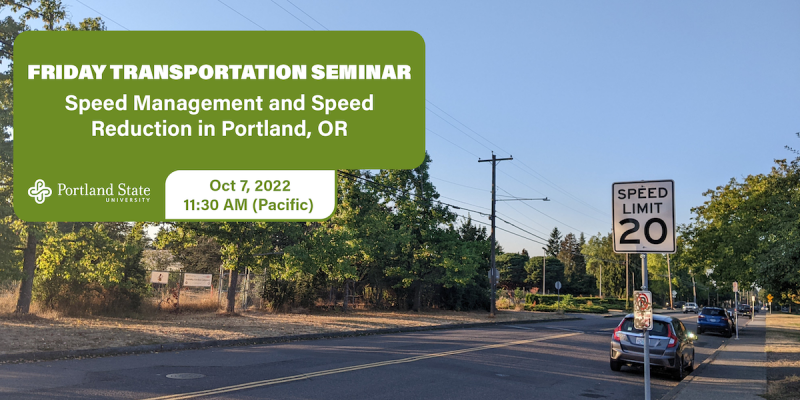
Friday Transportation Seminars at Portland State University have been a tradition since 2000. You can join us online or in-person at 11:30 AM. All presentations are recorded and shared on the event page afterwards.
PRESENTATION ARCHIVE
THE TOPIC
In 2015, the Portland City Council unanimously passed a resolution committing Portland to Vision Zero, the goal to eliminate traffic deaths and serious injuries. An underpinning of Vision Zero is that streets are managed for safe speeds. This presentation will summarize Portland's speed management process, how it relates to achieving Vision Zero, and present two case studies in which speed limits were reduced: (1) a 25 mi/h to 20 mi/h reduction on residential streets and (2) various reductions on arterials and collectors. Reduction sites in which additional treatments were implemented, such as speed humps and fixed speed safety cameras, will also be discussed. Results of the data analysis will be shared, along with next steps in Portland's speed management process.
KEY LEARNING OUTCOMES
- Knowledge of Portland's Speed Management process and how it impacts safety;
- The effects of speed limit reductions on observed vehicle speeds for different roadway classifications;
- The effects of speed limit reductions in conjunction with other treatments on observed vehicle speeds;
- Application of statistical models to determine effects of treatment
SPEAKER
Jason Anderson, Research Associate & Adjunct Instructor, Portland State University
Dr. Jason C. Anderson is a research associate and adjunct instructor at Portland State University. Dr. Anderson’s expertise is in data analytics, particularly advanced statistical and econometric methods, with an emphasis on transportation safety, transportation economics, travel behavior, and policy (impacts of policy changes on safety). His work on policy-related contexts has led Oregon to develop and maintain a Safety Action Plan aimed at reducing truck driver-at-fault crashes on state highways. He was also part of a team that updated Oregon’s safety investigation tools. He has been PI and Co-PI on projects related to each of these areas. Although much of Dr. Anderson’s work has been focused on freight transportation, he has worked on several projects that focus on various modes. His work on pedestrian safety has led to countermeasure evaluation and selection in the state of Oregon. Dr. Anderson’s research on transportation safety has helped advance fundamental knowledge on various factors that influence the risk and severity of freight transportation-related crashes and the effects of speed limit changes on driving behavior and safety. Recently, Dr. Anderson has begun fusing these statistical and econometric methods with machine learning approaches to study transportation safety and travel behavior.Clay Veka, Vision Zero Coordinator, Portland Bureau of Transportation
Clay Veka (she/her) is the Vision Zero Coordinator at the Portland Bureau of Transportation (PBOT). She has worked in traffic safety for 15 years, including joining PBOT’s Vision Zero team when it launched in 2015. Clay has her master’s degree in Urban Design and Planning from the University of Washington.PROFESSIONAL DEVELOPMENT
This 60-minute seminar is eligible for 1 hour of professional development credit for AICP (see our provider summary). We can provide an electronic attendance certificate for other types of certification maintenance.
Portland State University's Transportation Research and Education Center (TREC) is home to the U.S. DOT funded National Institute for Transportation and Communities (NITC), the Initiative for Bicycle and Pedestrian Innovation (IBPI), PORTAL, BikePed Portal and other transportation grants and programs. We produce impactful research and tools for transportation decision makers, expand the diversity and capacity of the workforce, and engage students and professionals through education and participation in research.

